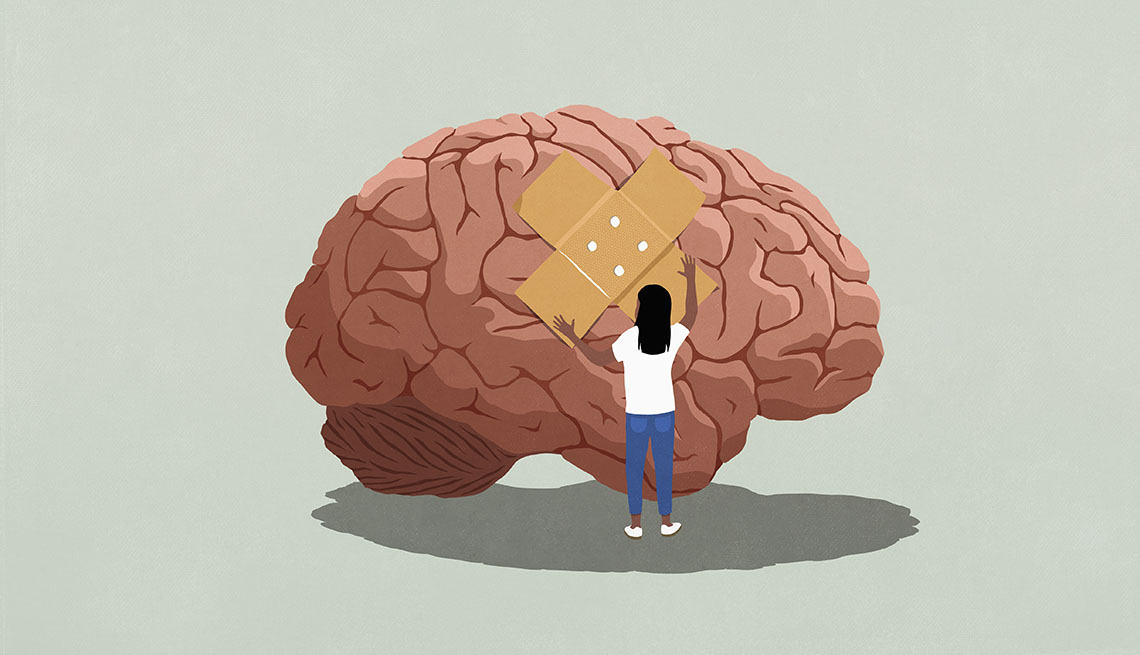5 things to know about concussions
5 things to know about concussions"
- Select a language for the TTS:
- UK English Female
- UK English Male
- US English Female
- US English Male
- Australian Female
- Australian Male
- Language selected: (auto detect) - EN
Play all audios:
Adding to the risk is the use of blood thinners, a common type of medication among the older population. If you’re being evaluated for a fall, it’s important to tell your doctor about all of
the medicines you are taking, including over-the-counter antiplatelet drugs like aspirin. And because bleeding can be slow and, as Figler explains, “accumulate over the course of time,”
don’t be surprised if your doctor keeps you overnight for observation. “The key is making sure that we’re monitoring people afterwards, because the biggest risk is missing that [bleeding]
and somebody potentially dying from an intracranial bleed,” he adds. 4. REST IS THE KEY TO RECOVERY The good news: Most people with a concussion recover quickly and fully, the CDC says,
though the process may be slower in older adults. Recovery typically involves a lot of rest — both physical and mental — in the first few days. Then, as symptoms improve, you can ease back
into routine activities. Not giving your brain enough time to recover could put you at risk for more long-term injuries if you take another hit to the head. “When your brain is already in a
state where there’s a mild injury and it’s healing, sometimes that second injury becomes something more life-threatening,” Chu says. 5. YOU CAN REDUCE YOUR RISK FOR BRAIN INJURIES One
message doctors and public health officials want to drive home is prevention. Always wear a helmet when you are biking or skiing, Chu advises. And don’t forget your seat belt in the car.
Older adults, in particular, can take a few extra steps to reduce their risk of falling, and therefore their risk of a concussion. At the top of the list: Exercise often and be sure to focus
on exercises that help to improve your strength and balance. “Exercise is one of the most important components that we think can help reduce the risk of falls,” Figler says. “And I can’t
stress balance enough. Balance is a huge component, because balance is a neurological and a muscular function that, combined, keeps us upright. And when we lose that balance, for whatever
reason, we are at a significant increased risk of falling.” Ask your doctor to check your eyes and feet annually. And while you’re there, be sure to have your list of medications reviewed.
Some drugs, or a combination of them, can make you feel dizzy or sleepy and put you at risk for a fall. “There are typically other medications we can potentially try that might make a
difference,” Figler says. Make sure you’re staying hydrated, since dehydration can cause falls. Finally, take stock of tripping hazards in your home and remove them. Clear clutter in
high-traffic areas (especially on stairs) and remove small throw rugs or use double-sided tape to keep them from moving, the CDC recommends. Use nonslip mats in the bathtub and swap dim
lights for brighter bulbs. Video: Why TBIs Can Be More Dangerous in Older Adults _Editor's note: This story, first published March 10, 2023, has been updated to include new
information._
Trending News
Prognostic significance of glutathione s-transferase-pi in invasive breast cancerABSTRACT Glutathione _S_-transferase pi (GST-pi), a Phase II detoxification enzyme, has recently been implicated in prot...
Trisha goddard gives health update as she battles advanced breast cancerFormer chat show host Trisha Goddard gave her followers an insight into her health as she grapples with stage four breas...
Application of diffusion tensor imaging for the diagnosis of segmental level of dysfunction in cervical spondylotic myelopathyABSTRACT STUDY DESIGN: A retrospective study. OBJECTIVES: Diffusion tensor imaging (DTI) reflects pathological change in...
Tourism stepping up climate actionAccess through your institution Buy or subscribe Along with employment and financial turnover, tourism has a substantial...
Uk not prepared for ww3: ‘critical elements’ of programme delayedIRAN-US CONFLICT COULD ‘SUDDENLY GO OVER THE EDGE’ SAYS EXPERT Tom Plant, director of Proliferation and Nuclear Policy w...
Latests News
5 things to know about concussionsAdding to the risk is the use of blood thinners, a common type of medication among the older population. If you’re being...
Sunny leone makes a confession, reveals that she is tempted by sweetsIndo-Canadian adult film star-turned-actress Sunny Leone has confessed to having a sweet tooth and admits that she puts ...
Bigg boss 16: from nimrit's doubts to a dad's call, all that’s bothering housemates these days_Bigg Boss 16_ is pulsating with high-voltage drama. With guests like Fahmaan & The Golden Boys entering the house, ...
Ndg panel and iigop minutes, 2015Corporate report NDG PANEL AND IIGOP MINUTES, 2015 Minutes of 2015 meetings of the Independent Information Governance Ov...
Microsoft launches new healthcare division based on artificial intelligence softwareCara McGoogan 24 September 2017 4:43pm BST Microsoft is setting up a new healthcare department at its Cambridge researc...
